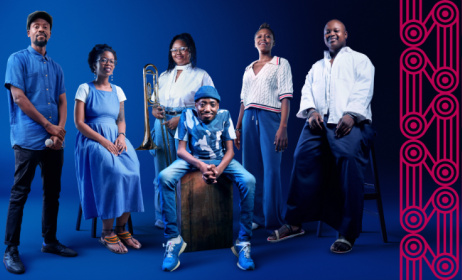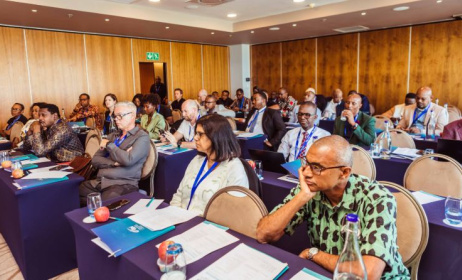Why South Africa's creatives can't accept the Copyright Amendment Bill
The South African government is under fire following a protest by a group of composers, writers and publishers who yesterday implored President Cyril Ramaphosa not to sign the controversial Copyright Amendment Bill into law.
 Composers, writers and publishers protest against the Copyright Amendment Bill in Cape Town, South Africa on 9 April. Photo: Twitter
Composers, writers and publishers protest against the Copyright Amendment Bill in Cape Town, South Africa on 9 April. Photo: Twitter
The protest, which was organised under the auspices of the Trade Union for Musicians of South Africa (TUMSA), saw artists marching from Keizersgracht Street to Cape Town Station where Ramaphosa was expected to unveil new trains. The protesting group argues that the bill does not protect the intellectual property right of artists, writers and publishers.
Music producer and TUMSA general secretary Gabi le Roux yesterday handed over a memorandum of demands to Deputy Finance Minister Mondli Gungubele.
“It’s a legal march in cooperation with COSATU [Congress of South African Trade Unions] and our memorandum states very clearly that we believe the bill in its current draft is unconstitutional, unrepresentative and leans heavily towards user rights with very little additional protection for creator and composers’ rights,” Le Roux told the SABC.
He added: “As musicians, composers and artists of this country, we want to indicate to the president that we are totally against the bill in its current form. This copyright is copywrong, please sir, don’t sign away our song.”
Why are South Africa's creatives unhappy?
The Cape Town protest comes after a prolonged process and much criticism from South Africa's creative industries, and seems to be the very last attempt to influence its signing into law.
Speaking to SAfm last week, trademark law specialist Stephen Hollis laid out a detailed history of the amendment bill and said it was injurious in its entirety. He also took the opportunity to applaud the European Parliament for approving the Directive on Copyright in the Digital Single Market, simply known as known as the EU Copyright Directive, and described the move as a milestone. He said the EU Copyright Directive and South Africa’s Copyright Amendment Bill were worlds apart.
“The problem with the amendment bill is that it doesn’t strike a balance between creators and users,” Hollis said. “It’s entirely in favour of users, which is very interesting because last week, I think it was Tuesday, the European Parliament made a landmark decision where they adopted articles 11 and 13 of the Directive on Copyright in the Digital Single Market.
“Basically what that means is that there is a larger responsibility being placed in Europe on the so-called user-upload digital services, which make use of copyright protected materials without investing in the creation of those materials. So, in Europe what the Parliament is saying is that we need to address this growing value gap where we've got these Internet platforms. You can think of for instance YouTube and you are a musician and you have so much of your works on these sites. The problem is you don’t always get sufficient remuneration because there is not enough responsibility or obligation placed on those platforms to remunerate fairly.
"So, in Europe they're going towards trying to repair that balance and in South Africa, unfortunately, we are going completely the other direction and saying, let’s find more ways for users to access, to reproduce, to adapt all the creators' work without the need to pay market related royalties. One of the catalysts for the copyright change is not only the digital developments but in fact also a group of musicians who approached the office of president Zuma around 2009 to say, Mr President a law was amended in 2002 to introduce a new royalty streams for performers called 'needletime' but we still haven’t received any meaningful distribution, please help. [Minister of Trade and Industry] Rob Davies then commissioned an enquiry, which led to the Copyright Review Commission Report, which contained very meaningful and valuable recommendations on how we should improve the plight of our creatives, especially in the music industry.
“Everyone was quite excited when the copyright reform process started taking shape. We expected to see a lot more protection for our creatives, especially in the music industry. But we were quite shocked when the first draft bill appeared. There was no consultation with any of the major organisations that represent creatives; there was only consultation by the DTI [Department of Trade and Industry] with so-called big-tech representatives and academics advancing their cause.
"Everyone was quite shocked to see in the first draft bill that users were awarded the rights to reproduce works. Users were awarded the rights to share equally in royalty distributions with musicians. And users were even allowed to transfer copyright out of the hands of copyright owners. So what we first thought was an obvious drafting error, later on it was realised that there were a lot of hidden agendas with the bill, so those user rights were written out because of massive opposition, especially during the parliamentary hearings in 2017."
Hollis is not the only intellectual property specialist who fears the signing of the bill. In a recent interview with Music In Africa, outgoing Southern African Music Rights Organisation (SAMRO) CEO Nothando Migogo said the bill would do a disservice to South Africa's creatives.
“The whole problem with the Copyright Amendment Bill is that we've been trying to articulate for some time that it doesn’t go far enough to protect composers and rights holders,” she said. “Even though it gives composers a right of communication to the public, meaning 'no one can communicate my music publicly such as streaming without my permission', the bill doesn’t go far enough to say, 'When someone streams your work without your permission here is a clearly actionable punitive clause that you can invoke to protect that.'
"The bill is closely linked to the Performers' Protection Amendment Bill but some of the arguments are quite different and particularly as to how the rights holders of creative works perceive the effects of the different bills. The Copyright Amendment Bill has many clauses that ultimately limit the rights of composers and authors. Most importantly, it introduces wide fair-use principles that limit the rights of creators without the case law that allows such principles to work practically, as in the US. But it also fails to implement counter-balancing, pro-creator provisions, such as the highly sought-after private copying levy.”
Gungubele is still to respond to TUMSA's memorandum of demands.



































Comments
Log in or register to post comments